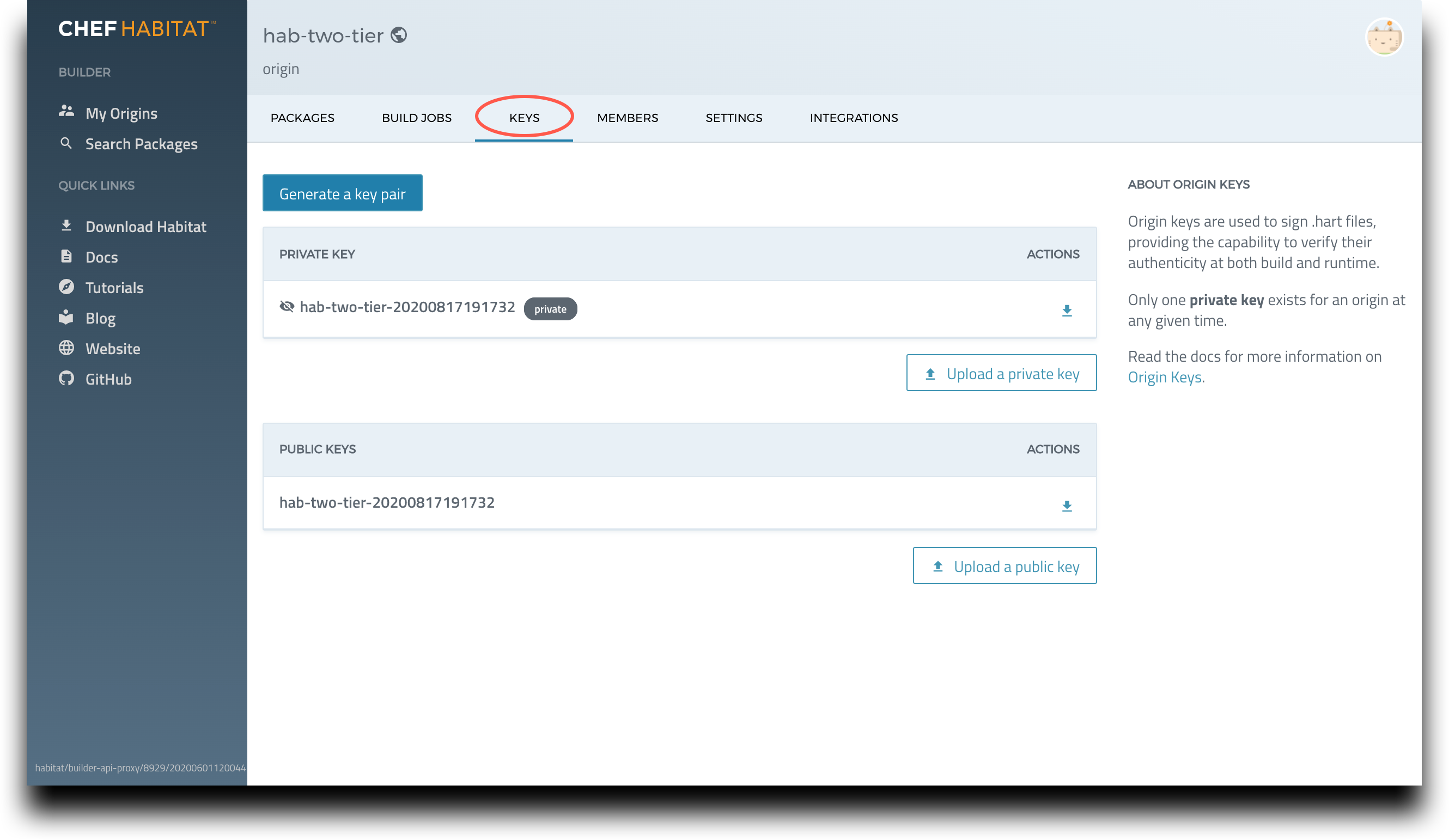Habitat origin keys
When you create an origin, Chef Habitat On-prem Builder automatically generates origin keys. Origin key cryptography is asymmetric: it has a public origin key that you can distribute freely, and a private origin key that you should distribute only to users belonging to the origin.
Chef Habitat uses origin keys in the following ways:
- When you build an artifact in your local environment, Chef Habitat signs the artifact with a public key.
- When you upload an artifact to Chef Habitat On-prem Builder, Chef Habitat verifies that the artifact was signed with its public key.
- When you install an artifact on a Chef Habitat Supervisor, Chef Habitat uses the public origin key to authorize the artifact’s installation; Chef Habitat only installs artifacts for which it has the public origin key.
- When you download an artifact to your local environment, Chef Habitat uses the public origin key to verify the artifact’s integrity before it starts the installation.
Prerequisites
- Download and installed the Chef Habitat CLI.
- Create a Chef Habitat On-prem Builder account.
- Generate a personal access token.
- Create an origin with
hab origin createor join an origin by invitation.
Key access
All Chef Habitat On-prem Builder users with access to the origin can view the origin public key revisions in the origin key tab (Builder > Origin > Keys) and download the origin public key, but only origin members with the administrator or owner roles can view or download the origin private key, or change the origin key pair.
| Keys Actions | Read-Only | Member | Maintainer | Administrator | Owner |
|---|---|---|---|---|---|
| View keys | Y | Y | Y | Y | Y |
| Add/Update/Delete keys | N | N | N | Y | Y |
Key filename format
Chef Habitat On-prem Builder origin keys use the following format:
- Public key:
<ORIGIN>-<DATETIME>.pub - Private key or signing key:
<ORIGIN>-<DATETIME>.sig.key
For example, in:
testorigin-20190416223046.pub
testorigin-20190416223046.sig.key
testoriginis the origin’s name.20190416223046is the date and time of the key’s creation, which was 2019-04-16 22:30:46..pubis the file extension for the public key..sig.keyis the file extension for the private key, which is also called a signing key.
Get origin keys
When you create an origin, Chef Habitat On-prem Builder automatically generates an origin key pair and saves both keys. To view an origin’s keys on Chef Habitat On-prem Builder, navigate to the origin and select Keys. Anyone can view and download an origin’s public keys, but only origin owners and administrators can view or download an origin private key, or change the origin key pair.

Download origin keys
To download your private or public origin key, select Download this key under the Actions heading.
Upload origin keys
To upload a public or private origin key in Chef Habitat On-prem Builder, select either Upload a private key or Upload a public key and paste your key into the dialog box that appears.
Manage origin keys with the CLI
Run Chef Habitat CLI commands from your local environment or from within the Chef Habitat Studio.
For more information, see the hab origin key CLI documentation.
Find your local origin keys
Chef Habitat stores your public and private origin keys at ~/.hab/cache/keys on Linux systems, C:\hab\cache\keys on Windows, and at /hab/cache/keys inside of the Chef Habitat Studio environment.
Find your origin keys in your local environment
On Windows:
Get-ChildItem C:\hab\cache\keys
On Linux or macOS:
ls -la ~/.hab/cache/keys
Find your existing origin keys from inside of the Chef Habitat Studio
On Windows:
Get-ChildItem C:\hab\cache\keys
On Linux or macOS:
ls -la /hab/cache/keys
Generate origin keys with the CLI
When you create an origin in Chef Habitat On-prem Builder, Builder automatically generates an origin key pair.
The Chef Habitat CLI creates origin key pairs through two different commands, for two different uses:
- Use
hab setupto generate your first origin key pair as part of setting up thehabCLI. - Use the
hab origin key generatecommand to create an key pair for an origin created with thehab origin createcommand
To create an origin key with the hab CLI, run the hab origin key generate command:
hab origin key generate <ORIGIN>
Download origin keys with the CLI
To download your public origin key using the command line, use hab origin key download command:
hab origin key download <ORIGIN>
Upload origin keys with the CLI
Creating an origin with the hab origin create command registers the origin on Chef Habitat On-prem Builder without creating an origin key pair. The hab origin key generate command creates the key pair and saves them in your local environment, but it does not upload either origin key to Chef Habitat On-prem Builder.
- Only origin members with the administrator and owner roles can upload new keys to an origin.
- Habitat On-prem Builder requires the public origin key to upload artifacts for that origin, so you’ll need to upload it.
- Habitat On-prem Builder requires the private origin key to enable new artifact builds from packages with plans linked to that origin.
Upload origin keys with the hab origin key upload command:
hab origin key upload <ORIGIN>
Upload the origin private key:
hab origin key upload --secret <ORIGIN>
Upload both origin keys at the same time:
hab origin key upload --secfile <PATH_TO_PRIVATE_KEY> --pubfile <PATH_TO_PUBLIC_KEY>
Import origin keys with the CLI
Use hab origin key import to read the key from a standard input stream into Chef Habitat On-prem Builder:
hab origin key import <KEY_STRING>
hab origin key import <PATH_TO_KEY>
curl <URL_THAT_RETURNS_KEY> | hab origin key import
Troubleshoot origin key import
On a macOS, you may encounter an upload failure. Follow these steps to remediate this failure:
Check that your
HAB_AUTH_TOKENenvironment variable is properly set and initialized.Add your
SSL_CERT_FILEto the environment variables in your interactive shell configuration file, such as your.bashrc. For example:export SSL_CERT_FILE=/usr/local/etc/openssl/cert.pemAfter you’ve added this variable to your shell configuration, reinitialize the shell configuration. For example:
source ~/.bashrc